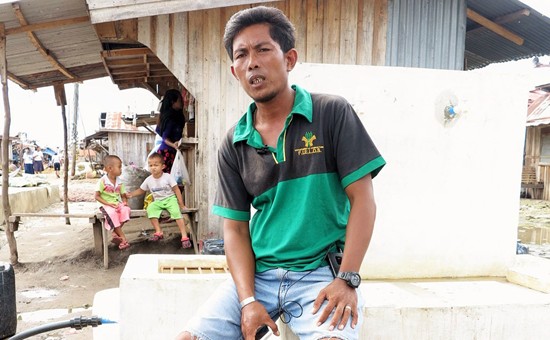|

Alawie
Asid, whose displaced family now lives in the transition site in
Barangay Taluksangay, Zamboanga City, says the new tap stands
around their community – just like the one behind him – relieve
them from traveling to a remote area to fetch clean water.
(By
NC-ND / ICRC / R. Ang) |
Clean water for
4,000 people in Zamboanga
By ICRC
November 5, 2015
MANILA – A
community-based water-supply system providing potable water to over
4,000 people, including displaced families, was officially inaugurated
today in Barangay Taluksangay, Zamboanga City.
The project, supported by
the International Committee of the Red Cross (ICRC) and the village
and city authorities, is a long-term solution to the shortage of water
in this barangay (village), which hosts about 900 people displaced by
the armed fighting in 2013.
“Water was really scarce
here in Taluksangay. It was difficult. Now our lives are better –
people in the community no longer fight to get first in line. We can
easily get water. We don’t have to ride our banca (boat) anymore
because the water source is near,” said Alawi Asid, whose family was
displaced from Layag-Layag.
Clean water started flowing
from nine communal tap stands in September, reaching a total of 4,000
people in Taluksangay transition site, the nearby relocation site, and
the host community. More people stand to benefit as the water system
has the ability to cover additional localities in the barangay. Only
half of the capacity of the water source has been used so far.
The project was built by 80
displaced people who were employed in a cash-for-work programme, with
the ICRC providing materials and technical expertise. It was recently
handed over to the Taluksangay Water and Sanitation Association (TAWASA),
which was formed with ICRC support, and which will operate and
maintain the project. To help the TAWASA sustain the project, the ICRC
gave them tools, spare parts and office supplies.
“The ICRC went beyond the
engineering works, focusing also on community organization and
empowerment. The community took ownership of the project, and the
system is self-sustaining, making it able to last for years to come,”
explained Marcel Goyeneche, who heads the ICRC office in Zamboanga.
Since the armed clashes in
2013, the ICRC has stayed on with the Philippine Red Cross to support
thousands of displaced people in Zamboanga in speeding up their
recovery and improving their health and living conditions.